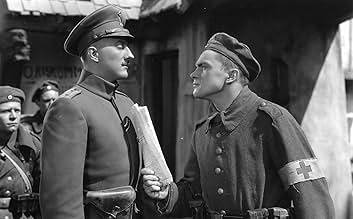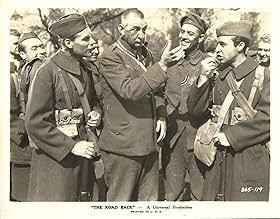After World War I, a group of former German soldiers try to adjust to civilian life.After World War I, a group of former German soldiers try to adjust to civilian life.After World War I, a group of former German soldiers try to adjust to civilian life.
John 'Dusty' King
- Ernst
- (as John King)
Larry J. Blake
- Weil
- (as Larry Blake)
- Director
- Writers
- All cast & crew
- Production, box office & more at IMDbPro
Storyline
Did you know
- TriviaFearful that this film would not do well overseas, the new regime at Universal Pictures severely edited the film before release, removing much of the strongly anti-Nazi slant that author Erich Maria Remarque included in the original novel, and which director James Whale intended to retain in the film version.
- ConnectionsFeatured in Now You See Him: The Invisible Man Revealed! (2000)
Featured review
It was in 1932 that James Whale found another piece of candy after 'Frankenstein'. It was called 'The Road Back', and it was the follow up novel to 'All Quiet on the Western Front'.
Universal was going to buy the rights and make the film. The book was not even written yet, but Remarque wanted fifty-thousand dollars.
But, when the book was published, it turned out to be not so hot. Universal decided to spend the money on other films, including 'Frankenstein'.
The film was revived though, after the Laemmles had lost the studio. Filming began on a strongly rainy night on January 27th, 1937.
It was a bad time to be shooting films outdoors. One man was killed when an explosive device knocked a gunner's tripod into shrapnel. George Daly, one of the actors, was pierced through the chest with a piece of wood.
The film went rapidly over budget and over time.
Then came the German government.
To make a long story short, they threatened Universal, and they threatened even some of the actors in the film. They wanted the movie to be killed. Charlie Rogers the production chief knew that he would not get the film into Germany, or into other countries pressured by Germany.
John King, the star was a downfall. Whale had decided to employ relatively unknown, and some actually unknown actors, as he had done in his early days in the London stage.
King simply couldn't handle the role, and the film was nearly finished before Whale realized it. Whale did what he did to actors that couldn't act well enough. He ignored him. He wasn't a particularly helpful man.
When the film was finished, it was two and a half weeks overdue and about two hundred thousand dollars over. That overage was enough for many a Universal movie, in total.
Whale got himself on the bad side of Charlie Rogers at that point. Whale got himself loaned out to Warner Brothers, and left Ted Kent, his favorite editor to handle the cut.
Then the German problem came back. As the film was about to be released, suddenly it was drawn back. Pressure from the German Embassy again.
Universal did have a fair amount of money invested in German properties. For whatever reason, Rogers found himself with a million dollar movie which he couldn't export, except to England. He gave in, and the movie was taken away from Kent and, to a great extent, destroyed.
The European nations that would not take the film without the changes largely still didn't take them. Brazil, China and Brazil refused it too, by German government request.
It was truly a disaster in just about every way.
But it was not the fault of James Whale.
Universal was going to buy the rights and make the film. The book was not even written yet, but Remarque wanted fifty-thousand dollars.
But, when the book was published, it turned out to be not so hot. Universal decided to spend the money on other films, including 'Frankenstein'.
The film was revived though, after the Laemmles had lost the studio. Filming began on a strongly rainy night on January 27th, 1937.
It was a bad time to be shooting films outdoors. One man was killed when an explosive device knocked a gunner's tripod into shrapnel. George Daly, one of the actors, was pierced through the chest with a piece of wood.
The film went rapidly over budget and over time.
Then came the German government.
To make a long story short, they threatened Universal, and they threatened even some of the actors in the film. They wanted the movie to be killed. Charlie Rogers the production chief knew that he would not get the film into Germany, or into other countries pressured by Germany.
John King, the star was a downfall. Whale had decided to employ relatively unknown, and some actually unknown actors, as he had done in his early days in the London stage.
King simply couldn't handle the role, and the film was nearly finished before Whale realized it. Whale did what he did to actors that couldn't act well enough. He ignored him. He wasn't a particularly helpful man.
When the film was finished, it was two and a half weeks overdue and about two hundred thousand dollars over. That overage was enough for many a Universal movie, in total.
Whale got himself on the bad side of Charlie Rogers at that point. Whale got himself loaned out to Warner Brothers, and left Ted Kent, his favorite editor to handle the cut.
Then the German problem came back. As the film was about to be released, suddenly it was drawn back. Pressure from the German Embassy again.
Universal did have a fair amount of money invested in German properties. For whatever reason, Rogers found himself with a million dollar movie which he couldn't export, except to England. He gave in, and the movie was taken away from Kent and, to a great extent, destroyed.
The European nations that would not take the film without the changes largely still didn't take them. Brazil, China and Brazil refused it too, by German government request.
It was truly a disaster in just about every way.
But it was not the fault of James Whale.
- jknoppow-1
- Feb 1, 2010
- Permalink
Details
- Runtime1 hour 40 minutes
- Color
- Aspect ratio
- 1.37 : 1
Contribute to this page
Suggest an edit or add missing content







































